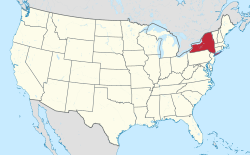Newburgh, N.Y.
| Newburgh | |||
|---|---|---|---|
| City | |||
|
Downtown Newburgh from Beacon,
across the Hudson River |
|||
|
|||
 Location in Orange County and the state of New York. |
|||
 Location of New York in the United States |
|||
| Coordinates: 41°31′11″N 74°1′17″W / 41.51972°N 74.02139°WCoordinates: 41°31′11″N 74°1′17″W / 41.51972°N 74.02139°W | |||
| Country | United States | ||
| State | New York | ||
| County | Orange | ||
| Settled | 1709 | ||
| Incorporated as village | 1800 | ||
| Incorporated as city | 1865 | ||
| Government | |||
| • Type | Council-manager | ||
| • City manager | Michael Ciavarino | ||
| • Mayor | Judy Kennedy (D) | ||
| Area | |||
| • Total | 4.78 sq mi (12.39 km2) | ||
| • Land | 3.81 sq mi (9.86 km2) | ||
| • Water | 0.98 sq mi (2.53 km2) | ||
| Population (2010) | |||
| • Total | 28,866 | ||
| • Estimate (2016) | 28,200 | ||
| • Density | 7,409.35/sq mi (2,860.69/km2) | ||
| Time zone | Eastern Time Zone (UTC-5) | ||
| • Summer (DST) | Eastern Daylight Time (UTC-4) | ||
| ZIP Code | 12550 | ||
| Area code(s) | 845 | ||
| FIPS code | 36-071-50034 | ||
| FIPS code | 36-50034 | ||
| GNIS feature ID | 0958498 | ||
| City of Newburgh, New York | |||
| Website | http://www.cityofnewburgh-ny.gov/ | ||
Newburgh /ˈnuːbɜːrɡ/ is a city located in Orange County, New York, United States, 60 miles (97 km) north of New York City, and 90 miles (140 km) south of Albany, on the Hudson River. Newburgh is a part of the New York CSA. The Newburgh area was first settled in the early 18th century by the Germans and British. During the American Revolution, Newburgh served as the headquarters of the Continental Army. Prior to its chartering in 1865, the city of Newburgh was part of the town of Newburgh; the town now borders the city to the north and west. East of the city is the Hudson River; the city of Beacon, New York is across the river; and it is connected to Newburgh via the Newburgh–Beacon Bridge. The entire southern boundary of the city is with the town of New Windsor. Most of this boundary is formed by Quassaick Creek. In May 2016, the city requested help for its PFOS contaminated water supply under Superfund.
At the time of European contact the area of Newburgh was occupied by the Waoranek, a branch of the Lenape. The area that became Newburgh was first explored by Europeans when Henry Hudson stopped by during his 1609 expedition up the river that now bears his name. His navigator, Robert Juet, is said to have called the site "a pleasant place to build a town", although some later historians believe he may actually have been referring to the area where Cornwall-on-Hudson now stands.
...
Wikipedia


